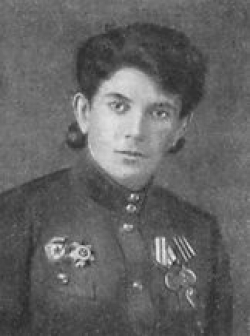Meri Zhukovitskaya was born in 1918 in Ekaterinoslav (present-day Dnipro, Ukraine), as one of several children in the family. In her hometown, she finished seven grades of a general education school, and then completed some vocational courses for factory work [It was common practice at the time for young people over 14 with little education to be trained for "blue-collar" professions – carpenters, stonemasons, plasterers, etc.] After completing this schooling, Meri began to work at the Dnepropetrovsk Train Car Plant. On one occasion, she attended a lecture on aviation by the head of an aero club at the plant, and this event was to change the course of Meri's life. In 1938, she joined the aero club. Initially, she served as technical secretary of the flying section, and then proceeded to work at the club as an airplane technician.
When the Soviet-German War broke out in late June 1941, Meri Zhukovitskaya wished to volunteer for frontline duty, but was rejected by the draft board, which explained that she would be of more use in the rear. Consequently, she was sent to Saratov, where she worked at an aircraft plant.
However, in late January 1942 the famous pilot Marina Raskova came to Saratov, looking for young female recruits for a women's aviation regiment. Given her experience in technical work at the aero club, Meri Zhukovitskaya was immediately accepted into the regiment. Her younger sister Ida, who lacked similar experience, was also accepted when the two sisters had managed to convince Raskova. Thus, in 1942 Meri Zhukovitskaya joined the Red Army as an aviation technician.
Soon, after completing a brief course, Meri was sent to the front as part of the 588th Women's Aviation Regiment (later renamed the 46th Guards Regiment). This all-female unit was staffed by young women aged 15 to 27. In the Soviet Union, it was humorously referred to as "Dunka's Regiment", from the diminutive form of the first name of its commander, Evdokiia Bershanskaya. The Germans called them "the Night Witches", because they tended to operate at night.
During the war, Meri served as a mechanic in an aircraft squad, facilitating approximately one hundred night sorties, while the regimental group under her command was responsible for more than 720 sorties. In 1943, Zhukovitskaya received a serious lung injury, but survived. She was given half a year's leave to recover, but returned to her regiment after a mere three months. Because of her compromised health, she could no longer work as a mechanic, so she was made assistant to the chief of staff of the squadron.
Meri saw action in the Crimea, the Caucasus, and Belorussia. She met the end of the war near Berlin. She was awarded the Order of the Red Star; the Order of the Patriotic War, 2nd Class, and some medals.
After the war, Meri returned to Dnepropetrovsk. She died in 1985.







